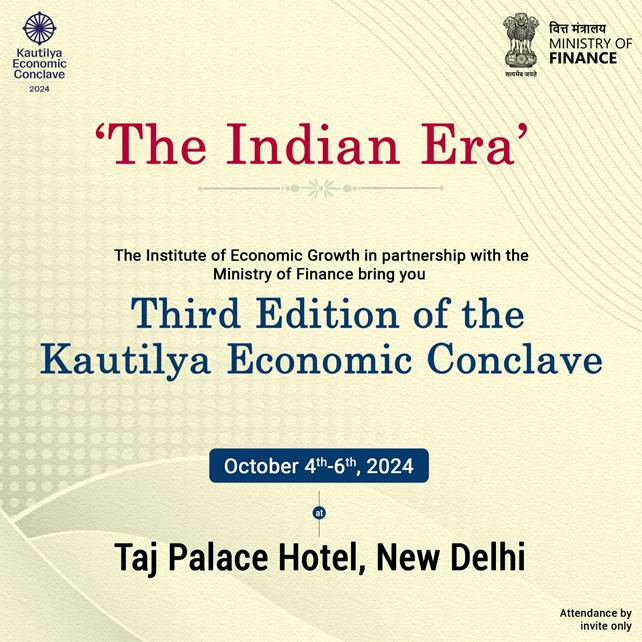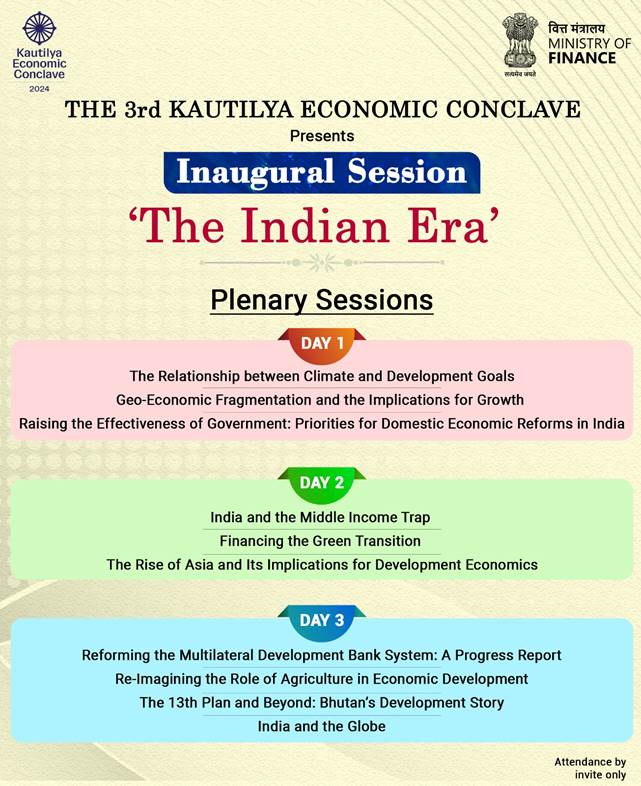| News | |||
|
Home |
|||
|
|
|||
Prime Minister Shri Narendra Modi to participate in Kautilya Economic Conclave on 4th October 2024 |
|||
| 3-10-2024 | |||
Department of Economic Affairs and Institute of Economic Growth to host third edition of Kautilya Economic Conclave with the theme ‘The Indian Era’, from 4th-6th Oct. 2024 in New Delhi Prime Minister Shri Narendra Modi will participate in the third Kautilya Economic Conclave on 4th October 2024 at around 6:30 PM at the Taj Palace Hotel, New Delhi. He will also address the gathering on the occasion. (Read more: https://pib.gov.in/PressReleasePage.aspx?PRID=2061357) The Institute of Economic Growth, in partnership with the Ministry of Finance, Government of India, will host the third edition of the Kautilya Economic Conclave (KEC), from October 4-6, 2024, in New Delhi. This conclave will bring together close to 150 national and international academicians and policy makers to discuss some of the most important issues confronting the Indian economy and economies of the global south.
Speakers at the Conclave include Union Minister for Finance and Corporate Affairs of India, Smt. Nirmala Sitharaman (inaugural session); Union Minister of External Affairs of India, Dr. S. Jaishankar (closing session); Mr Lyonpo Lekey Dorji, Minister of Finance, Bhutan; Mr P. K. Mishra, Principal Secretary to the Prime Minister, India; Mr Masood Ahmed, President Emeritus, Centre for Global Development, USA; Ms Vera Songwe, Chair, Liquidity and Sustainability Facility: Co-Chair of the High-Level Panel, Finance for Climate Action, USA; Sir Suma Chakrabarti, Chair of the Board of Trustees, ODI Global, UK; Dr Zaidi Sattar, Founder Chairman and Chief Executive, Policy Research Institute (PRI), Bangladesh; French Permanent Representative to OECD & Former French Minister, France; Mr Justin Yifu Lin, Dean, Institute of New Structural Economics, Peking University, China; Mr Erik Berglof, Chief Economist, Asian Infrastructure Investment Bank (AIIB), China; Prof Heizo Takenaka, Former Minister of Economic and Fiscal Policy; Professor Emeritus, Keio University, Japan; Mr Eduardo Pedrosa, Secretary-General, Pacific Economic Cooperation Council, Singapore; Mr Suman Beri, Vice Chairman, NITI Aayog, India; Dr Arvind Panagariya, Chairman, 16th Finance Commission of India; Mr Gita Wirjawan, Chairman of Ancora Group; Former Minister of Trade, Indonesia; Prof Robert Lawrence, Professor of International Trade and Investment, Harvard Kennedy School, USA; Mr Martin Raiser, Regional Vice President for South Asia, The World Bank, USA; Prof Jean Pierre Landau, Associated Professor and Researcher, Department of Economics, Sciences Po (Paris), and Research Fellow at the Harvard Kennedy School, France; Secretaries to the Government of India; and many more.
Over the last few years, the world economy has been subject to unprecedented shocks. After experiencing a once in a century pandemic, persistent military conflicts have disrupted supply chains leading to a rise in energy and food prices. Strategic blocks are beginning to emerge and are re-shaping themselves. From hyper-globalisation, the world has descended into “slow-balisation”. The political and fiscal re-alignments have impacted international trade and capital flows. Notwithstanding the global challenges, emerging markets have built up buffers, improved policy frameworks, and used buffers judiciously. Since 2021, India has been the world’s fastest growing large economy with a stable macroeconomic environment. The average growth of 7 per cent plus experienced by India is more than double the global average. This years’ conclave will focus on several themes, to name a few:
Some of the discussions in these sessions will range from how the Indian economy can create more regular jobs; how the rules-based multilateral system must adapt to prevent geo-economic fragmentation, and how progress through multilateral consensus can be made possible; harnessing India’s comparative advantage in AI, ML, and Fintech for job creation; assessing India’s current growth trajectory and considering ways in which India can maintain productivity growth by maximizing catch-up growth and developing innovation capabilities; studying the reforms needed to make the financial system more resilient as well as efficient; identifying the longer term reforms needed to achieve the goals of sustainable development; and discussing the challenge of managing climate change and achieving an energy transition to renewable energy. The conclave will showcase India’s increasing role as a bridge-maker of countries in the global south. India’s commitment to inclusive growth, responsible digital technology adoption, and a focus on amplifying the voice of the global south underpins its aspiration to become a developed nation by 2047, heralding what many are calling ‘The Indian Era’. The discussions in the conclave will serve as a precursor to the upcoming Annual Meetings of the IMF and the World Bank, COP 29, and the Brazilian G20 Leaders’ Declaration. |
|||
 9911796707
9911796707


